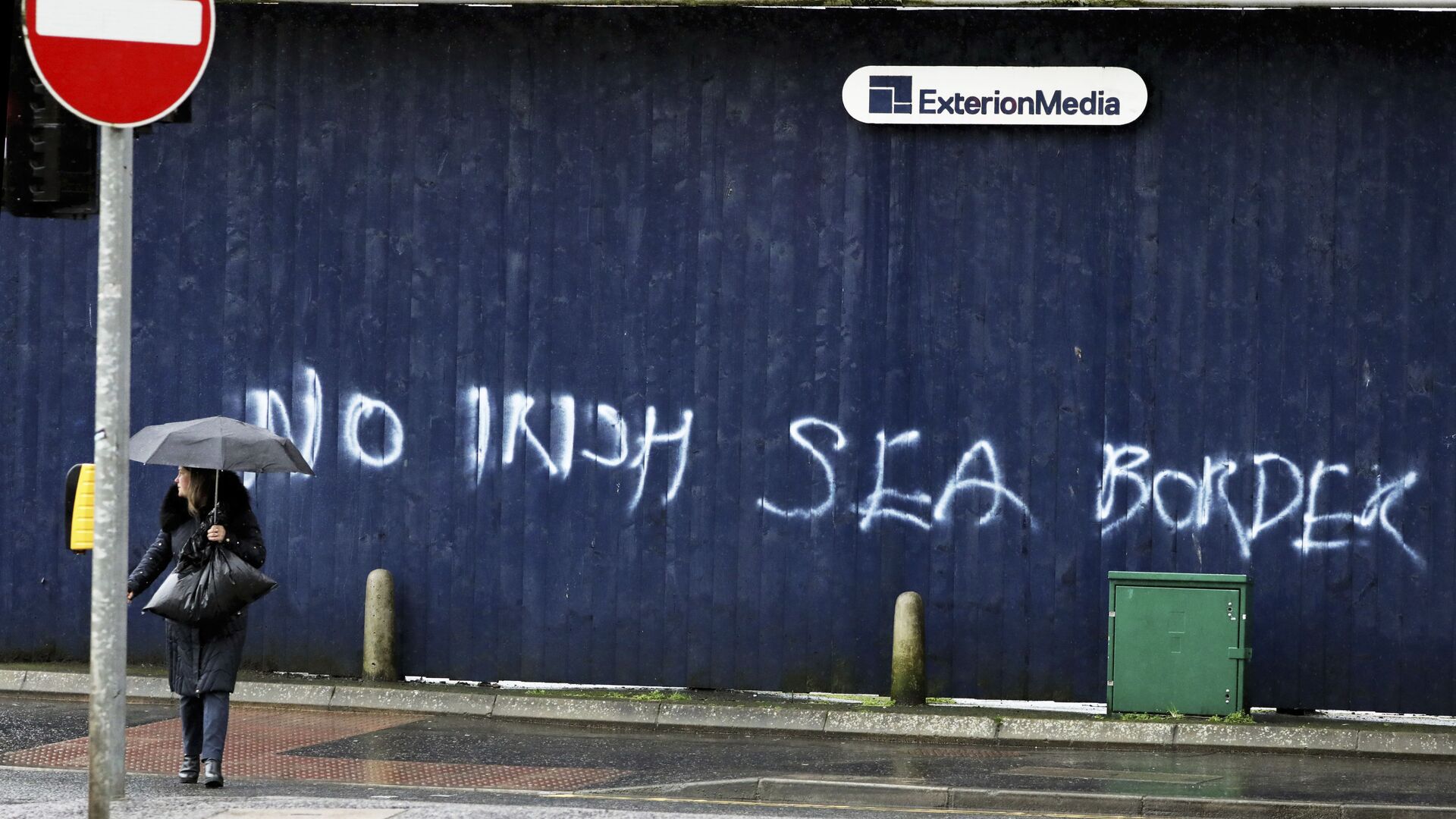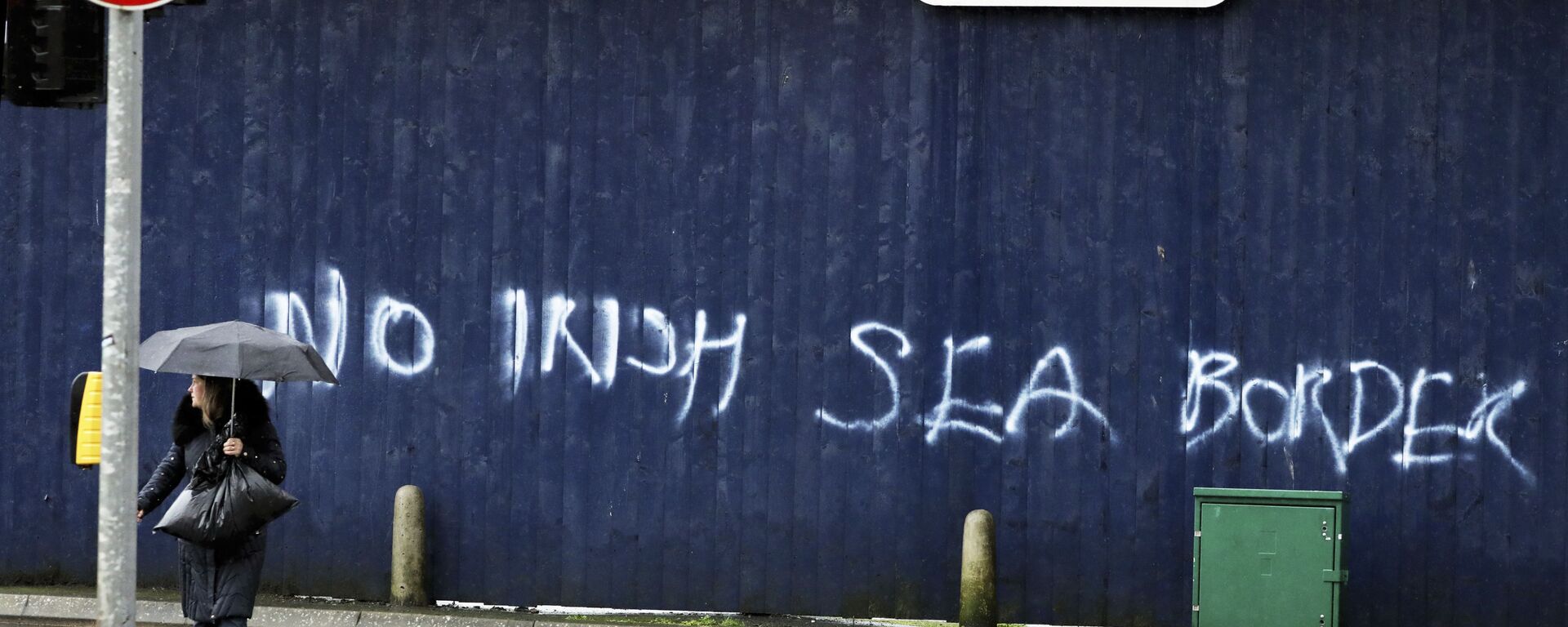https://sputnikglobe.com/20220518/eu-invokes-threat-of-trade-war-will-use-all-measures-at-its-disposal-if-uk-tears-up-ni-protocol-1095594537.html
EU Threatens Trade War, Will Use ‘All Measures at its Disposal’ If UK Tears Up NI Protocol
EU Threatens Trade War, Will Use ‘All Measures at its Disposal’ If UK Tears Up NI Protocol
Sputnik International
UK Foreign Secretary Liz Truss set out plans on Tuesday to table legislation that could override key parts of the 2019 Brexit deal relating to the NI Protocol... 18.05.2022, Sputnik International
2022-05-18T06:23+0000
2022-05-18T06:23+0000
2023-05-28T15:19+0000
brexit
northern ireland protocol
liz truss
boris johnson
european union (eu)
maros sefcovic
united kingdom (uk)
https://cdn1.img.sputnikglobe.com/img/07e5/02/07/1082003617_0:69:3399:1981_1920x0_80_0_0_b789180678ebd7f2523f9e6ce603e449.jpg
The European Commission has pledged to resort to “all measures at its disposal” if Britain’s Foreign Secretary Liz Truss presses ahead with a plan to scrap parts of the post-Brexit Northern Ireland protocol.The European Commission vice-president said Truss’s proposals raised “significant concerns”, adding: “Unilateral actions contradicting an international agreement are not acceptable.”NI Protocol GridlockThe renewed verbal sabre-rattling between the UK and the EU over post-Brexit trading arrangements centering on the Northern Ireland Protocol has yet again raised the spectre of a looming trade war.After the Brexit referendum to leave the European Union, Prime Minister Boris Johnson's government in 2019 agreed the trade deal, which governs how goods enter Northern Ireland from the rest of the UK. Known as the NI protocol, the arrangement keeps Northern Ireland (in the UK) aligned with the EU single market for goods, thus avoiding a hard border with the Republic of Ireland (in the European Union). This was done to safeguard a vital part of the 1998 Good Friday peace deal that put an end to several decades of violence in Northern Ireland. But the protocol, introduced in 2021, brought in some new checks on goods moving between Great Britain and Northern Ireland and has been slammed by unionist politicians for driving a wedge between their community and the rest of the UK.‘Unnecessary Bureaucracy’ & ‘Regulatory Barriers’Speaking in Parliament on Tuesday, Liz Truss said the Bill, set to be tabled “in the coming weeks”, would not result in the post-Brexit trade deal for Northern Ireland being jettisoned, but rather make limited changes to the protocol, such as removing "unnecessary bureaucracy" and regulatory barriers hampering the movement of UK-made goods.Specifically, it would presuppose creating a “green channel” allowing goods to be exported from Great Britain to Northern Ireland without checks as long as they were not destined for the Republic of Ireland. The UK would also be allowed to determine tax and spending in Northern Ireland.Truss underscored the “urgency of the situation,” saying that some firms had already left the Northern Irish market because the protocol was fraught with “significant costs and paperwork”, and furthermore, it jeopardised the stability of the Good Friday agreement.According to the Foreign Secretary, the proposed law will contain an “explicit” override clause, signifying that it can be immediately replaced if an agreement is reached with the European Commission.Liz Truss argued that the draft legislation was “compatible” with EU law and the government would ensure there are “robust penalties for those who seek to abuse the new system”.Truss emphasised that she wanted to make it “crystal clear” that negotiations with the EU would continue “in parallel” with the passage of the law through the Commons. Typically, the process could take up to a year.The announcement by Liz Truss was welcomed by the leader of the Democratic Unionist Party (DUP), Sir Jeffrey Donaldson, who said his party would take "cautious" steps to re-engage with power sharing in Northern Ireland.After elections to Northern Ireland's Assembly on 5 May resulted in a majority for politicians who accept the protocol, including the new largest party, Sinn Fein, the DUP refused to enter a power-sharing government at Stormont unless the protocol was revised.However, senior Tory backbenchers have warned the Foreign Secretary against breaking international law.Sir Bob Neil, Tory chairman of the Justice Committee, emphasised how important it was “not just in terms of the overall objective but also in terms of the United Kingdom’s international reputation” to adhere to the UK’s legal obligations.Unilaterally ditching parts of the NI protocol could result in the EU hitting UK goods with tariffs or, in a worst case scenario, Brussels could freeze the entire trade deal negotiated with Boris Johnson in 2020, according to Catherine Barnard, an EU law professor at the University of Cambridge, as cited by The Guardian.Truss told parliament on Tuesday that she will meet the European Commission vice-president Sefcovic and Northern Irish parties to discuss the full details of the Bill.
https://sputnikglobe.com/20220517/european-leaders-warn-uk-against-action-on-northern-ireland-customs-checks-1095578388.html
https://sputnikglobe.com/20220513/dup-boycotts-ni-assembly-speaker-vote-in-protest-at-eu-uk-customs-barrier-1095485352.html
united kingdom (uk)
Sputnik International
feedback@sputniknews.com
+74956456601
MIA „Rossiya Segodnya“
2022
News
en_EN
Sputnik International
feedback@sputniknews.com
+74956456601
MIA „Rossiya Segodnya“
Sputnik International
feedback@sputniknews.com
+74956456601
MIA „Rossiya Segodnya“
brexit, northern ireland protocol, liz truss, boris johnson, european union (eu), maros sefcovic, united kingdom (uk)
brexit, northern ireland protocol, liz truss, boris johnson, european union (eu), maros sefcovic, united kingdom (uk)
EU Threatens Trade War, Will Use ‘All Measures at its Disposal’ If UK Tears Up NI Protocol
06:23 GMT 18.05.2022 (Updated: 15:19 GMT 28.05.2023) UK Foreign Secretary Liz Truss set out plans on Tuesday to table legislation that could override key parts of the 2019 Brexit deal relating to the NI Protocol, including waiving all checks on goods from Great Britain to Northern Ireland where they are not destined for the Republic of Ireland.
The European Commission has pledged to resort to “all measures at its disposal” if Britain’s Foreign Secretary Liz Truss presses ahead with a plan to scrap parts of the post-Brexit
Northern Ireland protocol.
“Should the UK decide to move ahead with a Bill disapplying constitutive elements of the protocol as announced today by the UK Government, the EU will need to respond with all measures at its disposal,” the EU’s top official in charge of UK relations, Maros Sefcovic, was cited as saying by The Daily Telegraph.
The European Commission vice-president said Truss’s proposals raised “significant concerns”, adding: “Unilateral actions contradicting an international agreement are not acceptable.”
The renewed verbal
sabre-rattling between the UK and the EU over post-Brexit trading arrangements centering on the Northern Ireland Protocol has yet again raised the spectre of a looming trade war.
After the Brexit referendum to leave the European Union, Prime Minister Boris Johnson's government in 2019 agreed the trade deal, which governs how goods enter Northern Ireland from the rest of the UK. Known as the NI protocol, the arrangement keeps Northern Ireland (in the UK) aligned with the EU single market for goods, thus avoiding a hard border with the Republic of Ireland (in the European Union). This was done to safeguard a vital part of the 1998 Good Friday peace deal that put an end to several decades of violence in Northern Ireland.
But the protocol, introduced in 2021, brought in some
new checks on goods moving between Great Britain and Northern Ireland and has been slammed by unionist politicians for driving a wedge between their community and the rest of the UK.
‘Unnecessary Bureaucracy’ & ‘Regulatory Barriers’
Speaking in Parliament on Tuesday, Liz Truss said the Bill, set to be tabled “in the coming weeks”, would not result in the post-Brexit trade deal for Northern Ireland being jettisoned, but rather make limited changes to the protocol, such as removing "unnecessary bureaucracy" and regulatory barriers hampering the movement of UK-made goods.
Specifically, it would presuppose creating a “green channel” allowing goods to be exported from Great Britain to Northern Ireland without checks as long as they were not destined for the Republic of Ireland. The UK would also be allowed to determine tax and spending in Northern Ireland.
Truss underscored the “urgency of the situation,” saying that some firms had already left the Northern Irish market because the protocol was fraught with “significant costs and paperwork”, and furthermore, it jeopardised the stability of the Good Friday agreement.
“These practical problems have contributed to the sense that the East-West relationship has been undermined. Without resolving these and other issues, we will not be able to re-establish the Executive,” Truss told MPs.
According to the Foreign Secretary, the proposed law will contain an “explicit” override clause, signifying that it can be immediately replaced if an agreement is reached with the European Commission.
“We are clear the EU will not be negatively affected in any way, just as we have ensured the protection of the EU Single Market since the existence of the Protocol.”
Liz Truss argued that the draft legislation was “compatible” with EU law and the government would ensure there are “robust penalties for those who seek to abuse the new system”.
Truss emphasised that she wanted to make it “crystal clear” that negotiations with the EU would continue “in parallel” with the passage of the law through the Commons. Typically, the process could take up to a year.
The announcement by Liz Truss was welcomed by the leader of the Democratic Unionist Party (DUP), Sir Jeffrey Donaldson, who said his party would take "cautious" steps to re-engage with power sharing in Northern Ireland.
After elections to Northern Ireland's Assembly on 5 May resulted in a majority for politicians who accept the protocol, including the new largest party, Sinn Fein, the DUP refused to enter a
power-sharing government at Stormont unless the protocol was revised.
However, senior Tory backbenchers have warned the Foreign Secretary against breaking international law.
“Respect for the rule of law... runs deep in our Tory veins. I find it extraordinary that a Tory government needs to be reminded of that,” said Simon Hoare, Tory chairman of the Northern Ireland Affairs Committee.
Sir Bob Neil, Tory chairman of the Justice Committee, emphasised how important it was “not just in terms of the overall objective but also in terms of the United Kingdom’s international reputation” to adhere to the UK’s legal obligations.
Unilaterally ditching parts of the NI protocol could result in the EU hitting UK goods with tariffs or, in a worst case scenario, Brussels could freeze the entire trade deal negotiated with Boris Johnson in 2020, according to Catherine Barnard, an EU law professor at the University of Cambridge, as cited by The Guardian.
Truss told parliament on Tuesday that she will meet the European Commission vice-president Sefcovic and Northern Irish parties to discuss the full details of the Bill.



